#20th century psychology
Explore tagged Tumblr posts
Text
"Decoding the Enigma of Human Nature: William Walker Atkinson's Profound Exploration"
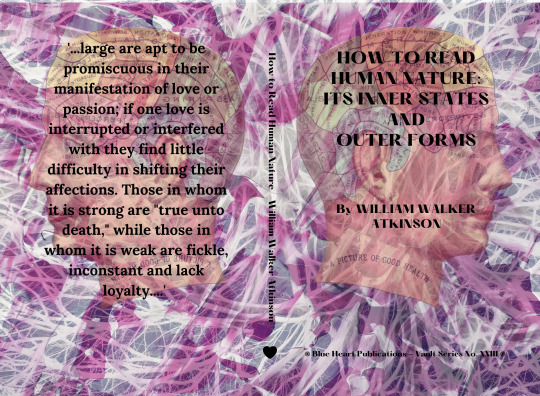
In "How to Read Human Nature: Its Inner States and Outer Forms," William Walker Atkinson embarks on an ambitious journey to unravel the intricate mysteries of the human psyche. Published in the early 20th century, Atkinson's work serves as a fascinating amalgamation of psychology, philosophy, and esoteric wisdom, offering readers a comprehensive guide to understanding both the internal workings and external expressions of human nature. The book's title itself hints at the dual focus—inner states and outer forms—that shapes the foundation of Atkinson's exploration.
Atkinson's prose, though rooted in the language of its time, remains remarkably accessible and engaging. The author's skill in elucidating complex psychological concepts is evident as he delves into the nuances of human behavior, emotions, and thought processes. One of the key strengths of the book lies in Atkinson's ability to bridge the gap between the esoteric and the practical, providing readers with tools to navigate the intricacies of human interactions in their daily lives.
The first part of the book delves into the inner states of human nature, exploring topics such as emotions, desires, and the subconscious mind. Atkinson draws on various psychological theories of his time, blending them with insights from mysticism and metaphysics. His exploration of the impact of thoughts and emotions on one's well-being and interactions reflects a holistic understanding of the human experience.
The second part of the book turns its attention to the outer forms of human nature—physical appearance, body language, and the expressions of personality. Atkinson asserts that external features can offer valuable insights into an individual's character, motivations, and potentialities. While some of the physiognomic theories presented may seem antiquated in the context of contemporary psychology, they offer a glimpse into the historical evolution of ideas surrounding the connection between appearance and character.
Atkinson's work also touches upon the concept of personal magnetism and the power of attraction. He argues that an individual's inner qualities can radiate outward, influencing their external environment and relationships. This exploration aligns with the broader metaphysical currents of the time, emphasizing the interconnectedness of mind, body, and spirit.
Despite the book's age, "How to Read Human Nature" maintains its relevance as a valuable resource for readers interested in the intersections of psychology, philosophy, and spirituality. Atkinson's interdisciplinary approach serves as a bridge between the scientific and the metaphysical, inviting readers to contemplate the intricate dance between internal states and external manifestations in the complex tapestry of human nature.
In conclusion, William Walker Atkinson's "How to Read Human Nature" is a thought-provoking exploration that transcends its historical context. While some aspects may reflect the scientific understanding of its era, the book's enduring value lies in its holistic approach to understanding human nature. It serves as an intriguing testament to the timeless quest to decipher the enigma of the human psyche, offering readers a unique perspective that straddles the realms of science and mysticism.
"How to Read Human Nature: Its Inner States and Outer Forms," by William Walker Atkinson is available in Amazon in paperback 10.99$ and hardcover 18.99$ editions.
Number of pages: 177
Language: English
Rating: 8/10
Link of the book!
Review By: King's Cat
#William Walker Atkinson#How to Read Human Nature#Inner states#Outer forms#20th century psychology#Esoteric wisdom#Comprehensive guide#Dual focus#Human behavior#Emotions#Thought processes#Accessible prose#Psychological concepts#Daily interactions#Subconscious mind#Mysticism#Metaphysics#Holistic understanding#Physiognomic theories#Personal magnetism#Power of attraction#Inner qualities#External environment#Relationships#Interdisciplinary approach#Science and mysticism#Spiritual exploration#Historical context#Thought-provoking#Deciphering human psyche
2 notes
·
View notes
Text
"Decoding the Enigma of Human Nature: William Walker Atkinson's Profound Exploration"
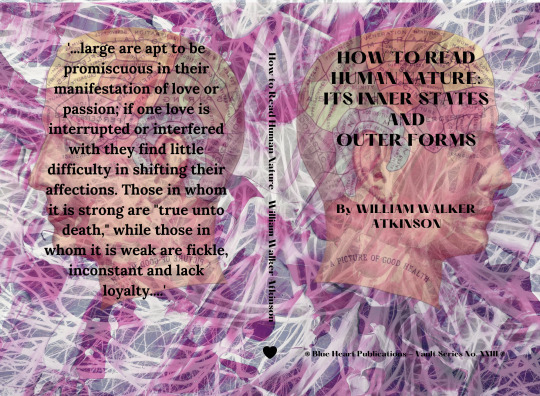
In "How to Read Human Nature: Its Inner States and Outer Forms," William Walker Atkinson embarks on an ambitious journey to unravel the intricate mysteries of the human psyche. Published in the early 20th century, Atkinson's work serves as a fascinating amalgamation of psychology, philosophy, and esoteric wisdom, offering readers a comprehensive guide to understanding both the internal workings and external expressions of human nature. The book's title itself hints at the dual focus—inner states and outer forms—that shapes the foundation of Atkinson's exploration.
Atkinson's prose, though rooted in the language of its time, remains remarkably accessible and engaging. The author's skill in elucidating complex psychological concepts is evident as he delves into the nuances of human behavior, emotions, and thought processes. One of the key strengths of the book lies in Atkinson's ability to bridge the gap between the esoteric and the practical, providing readers with tools to navigate the intricacies of human interactions in their daily lives.
The first part of the book delves into the inner states of human nature, exploring topics such as emotions, desires, and the subconscious mind. Atkinson draws on various psychological theories of his time, blending them with insights from mysticism and metaphysics. His exploration of the impact of thoughts and emotions on one's well-being and interactions reflects a holistic understanding of the human experience.
The second part of the book turns its attention to the outer forms of human nature—physical appearance, body language, and the expressions of personality. Atkinson asserts that external features can offer valuable insights into an individual's character, motivations, and potentialities. While some of the physiognomic theories presented may seem antiquated in the context of contemporary psychology, they offer a glimpse into the historical evolution of ideas surrounding the connection between appearance and character.
Atkinson's work also touches upon the concept of personal magnetism and the power of attraction. He argues that an individual's inner qualities can radiate outward, influencing their external environment and relationships. This exploration aligns with the broader metaphysical currents of the time, emphasizing the interconnectedness of mind, body, and spirit.
Despite the book's age, "How to Read Human Nature" maintains its relevance as a valuable resource for readers interested in the intersections of psychology, philosophy, and spirituality. Atkinson's interdisciplinary approach serves as a bridge between the scientific and the metaphysical, inviting readers to contemplate the intricate dance between internal states and external manifestations in the complex tapestry of human nature.
In conclusion, William Walker Atkinson's "How to Read Human Nature" is a thought-provoking exploration that transcends its historical context. While some aspects may reflect the scientific understanding of its era, the book's enduring value lies in its holistic approach to understanding human nature. It serves as an intriguing testament to the timeless quest to decipher the enigma of the human psyche, offering readers a unique perspective that straddles the realms of science and mysticism.
"How to Read Human Nature: Its Inner States and Outer Forms," by William Walker Atkinson is available in Amazon in paperback 10.99$ and hardcover 18.99$ editions.
Number of pages: 177
Language: English
Rating: 8/10
Link of the book!
Review By: King's Cat
#William Walker Atkinson#How to Read Human Nature#Inner states#Outer forms#20th century psychology#Esoteric wisdom#Comprehensive guide#Dual focus#Human behavior#Emotions#Thought processes#Accessible prose#Psychological concepts#Daily interactions#Subconscious mind#Mysticism#Metaphysics#Holistic understanding#Physiognomic theories#Personal magnetism#Power of attraction#Inner qualities#External environment#Relationships#Interdisciplinary approach#Science and mysticism#Spiritual exploration#Historical context#Thought-provoking#Deciphering human psyche
0 notes
Text

"Cigarette psychology" (1960s)
#retro#aesthetic#art#1960s#1960s history#1960s aesthetic#1960s fashion#psychology#cigarette#20th century#20th century art#grunge#vintage#1960s photography#1960s print
2K notes
·
View notes
Text

20th century boys "friend"
13 notes
·
View notes
Text
i’m not sure where this idea that dumbledore is the reason tom riddle became wizard hitler came from but i don’t buy it. i know the cool kid thing to do is blame dumbledore for every bad thing that happens in those books, but dumbledore isn’t the reason riddle was like that™️.
by the time dumbledore first meets riddle- he’s already traumatized those two kids in the cave so badly that they’ll never recover, killed some girl’s rabbit and hanged it from the rafters, and is a klepto. the kid literally meets the all childhood behavior indicators of a serial killer.
dumbledore in the meeting with riddle only displays concern for riddle and the other childrens’ well-being. he offers to help riddle and tells riddle that stealing/intimidating other students isn’t permitted at hogwarts. and he’s valid for pointing that out!! riddle admits to intimidating/stealing from the other kids. that’s something dumbledore kinda can’t let slide.
ppl cite dumbledore making a snide comment to harry about riddle wanting to be special as evidence he was out to get tom. current dumbledore made that comment as the result of knowing who tom riddle became. past dumbledore only vows to keep a close eye on him. present dumbledore even says he had no idea he’d just met wizard hitler. and past dumbledore’s not wrong for keeping an eye on riddle. also that’s common practice in the education system. when a child is noted to have behavioral issues (esp when those behaviors concern other students), admin will have a school counselor keep an eye on them or assign them a para. dumbledore also obv didn’t turn anyone against tom. everyone else loved him! so dumbledore’s watchful eye obv didn’t impact riddle’s school career really at all. all of the teachers believed he was a good role model student and he was even named head boy.
also even if, a teacher not liking or trusting you does not mean you get to become a neo-nazi. harry put up with snape’s bs and it didn’t lead to him declaring himself a “lord” and splitting his soul into pieces.
it was also the 1940s/30s and muggles did not have the psychological abilities/knowledge that we do today. wizards 1000% didn’t. if he’d been sent to a psychiatrist then, they just would’ve said some freudian bs about his mother and not actually helped with his problem of lack of empathy/guilt
the reason that riddle’s like that™️ is actually pretty understandable and makes sense psychologically. we know now (and actually by the 50s) that children who are starved of physical contact/emotional connection/and stability in early childhood can struggle to develop empathy, feel guilt, form connections, and that can lead to deviant immoral behavior. riddle grew up in an orphanage in the 40s during wwii with no familial connection. having abilities would make him feel “special” and better than the other orphans bc his abilities are the only thing he has going for him. add that to the above issues, and you’ve got someone that would abuse their powers for their own gain, especially to feel “special”. like tbh riddle’s prob not that different psychologically to like charles manson or jim jones (which is peak irony that a therapist in the muggle world could actually easily be able to explain his psyche while the wizarding world struggles)
my final point is this: dumbledore, while extremely flawed, isn’t the reason tom riddle became voldemort. if anything, slughorn and the old headmaster drove him to that end through their enabling far more than dumbledore did by keeping an eye on him. we even saw in riddle’s diary that “keeping an eye on him” consisted of dumbledore basically asking tom “you good?” when seeing him in the corridor. a behavior that reminds harry of dumbledore’s own interactions with him. and yeah eventually dumbledore called riddle out and was like “i heard you’re a fascist now” but that was after riddle had killed his own father, set a giant snake loose in the school, started calling himself “lord voldemort”, and started the wizard hitler youth
#harry potter#albus dumbledore#pro dumbledore in the way that i think he’s a complex man doing what he thinks is best#tom riddle#i think at some point in the 20th century the muggle world surpasses the wizarding world in abilities/power#the muggle world invents the internet & social internet & nuclear power & ai & planes & email & the iphone & psychology & ssri’s
21 notes
·
View notes
Text


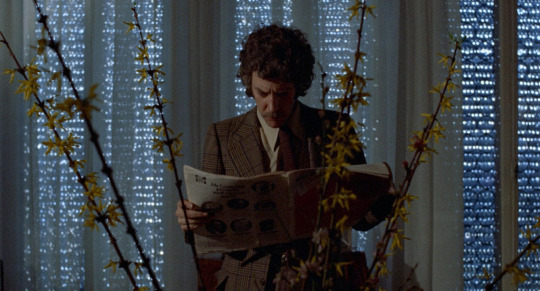




don’t look now (1973)
based on the short story of the same name by daphne du maurier (author of rebecca & the birds)
update june 20, 2024. REST IN PEACE TO ONE OF MY FAVORITE ACTORS 😭😭 i am devastated. rest in peace donald sutherland, i love you 💔💔
#70s horror#films#movies#20th century#1970s#70s#horror#scary movies#horror movies#psychological horror#thriller#donald sutherland#daphne du maurier#literature#scary
33 notes
·
View notes
Text
If there’s one thing I’ve learned during my school career, it’s that whenever you write ‘According to Sigmund Freud,’ in an essay, that is an invitation for the person grading it to leave, get a snack, emotionally prepare, and come back later.
#sigmund freud#freud's last session#psychology#dark academic aesthetic#dark academia#chaotic academic aesthetic#chaotic academia#studyblr#study motivation#studyspo#history#european history#science history#science humor#school#20th century
8 notes
·
View notes
Text
I am absolutely fascinated by unforced errors online. I have fallen down an information literacy rabbit hole while reading and I am seeing the exact same tropes I found playing out online.
I have seen someone, nearly in the same breath, decry how older Black women organize the Democratic Party in the States to then say “leftists should adopt [something that Black women organizers already do with the Democrats].”
It’s to the point where I truly believe that if Republicans got school vouchers passed, leftists would organize to cap the cost of school tuition, while pointing out how Republicans are going to go after public parks next. And, meanwhile, mainstream party members would coalition to try and fight for education reform (again) on the basis that not having free public school violates children’s civil rights. Again.
Chances are, no one on this platform has any idea what that last paragraph meant.
Some of them, while calling themselves US political activists.
You guys don’t argue left-wing talking points. You argue left-wing talking points filtered through the gaze of the hard right.
And that’s why so many protests and political movements lead to nothing. In the US and Canada especially, we are losing skilled organizers faster than we are gaining new ones.
The truth that “no one wants to take orders [from older Black women, usually*]” has become “we don’t need anyone telling us what to do.”
You cannot squash down complex political problems on different axes trying to see if the newest oversimplification makes sense. It doesn’t. That’s why you need to focus your attention, listen, and build coalitions.
But ultimately this won’t matter because I have heard from many younger organizers in non-Black spaces. We all have.
They don’t want leaders.
They want statues.
That way, they can insist their personal thoughts were endorsed by legends.
*circumstances may vary
#off topic#not fiber arts#I am so bitter#but what else can i do#we are quickly losing territory on the ground#brought to you by#people online deciding that commodification and commercialization are the same thing#also brought to you by#people unwilling to take accountability for mistakes disruptors and disinformation#if anyone pushes the idea that if someone says there are no leaders there are no outside influences#they’re wrong because that’s not how people (socially or psychologically) work#it’s just a redux of a false sense of objectivity#we don’t exist in a vacuum#other contributors to this thought: the 20th century#us politics
12 notes
·
View notes
Text

me refraining from going on a tirade about how "freeze" and "fawn" aren't parasympathetic nerve responses every time i see that poll
#speak friend and enter#to grossly oversimplify: the part of your brain responsible for fight or flight reactions thinks its still 10000 bce.#your parasympathetic nervous system doesn't know what 20th century social mores are. 'fawning' is not a fear response it's a social cue#when your brain believes you are in a life or death situation you will experience one of two urges: to fight back or to run. that's it#the urge to people please is not going to be called upon in a life threatening situation. that's not how that works#and don't even get me started on how people want to say 'oooh i always fawn im so smol and demure'#like. i hate to break it to you but you're an animal. animals don't survive by being smol and demure.#animals can and do rip each others faces off. you do possess the 'rip that guy's face off' instinct whether you like it or not.#sorry if that doesn't jive with the steven universe school of social psychology ¯\_(ツ)_/¯
12 notes
·
View notes
Text
“нетерпимость по отношению к другим людям опережает строгость по отношению к себе. Я узнает, что достойно порицания, но защищается от неприятной самокритики при помощи этого защитного механизма. Сильное негодование по поводу чужих неправильных поступков - предшествование и замещение чувства вины по отношению к самому себе. Негодование Я возрастает автоматически, когда близится восприятие его собственной вины.”
Intolerance towards other people precedes strictness towards oneself. The ego learns what is worthy of censure but defends itself from unpleasant self-criticism with the help of this defense mechanism. Strong indignation about the wrong actions of others precedes and replaces the feeling of guilt towards oneself. The indignation of the ego increases automatically when the perception of its own guilt approaches.
Anna Freud (Psychoanalyst, Child Psychologist)
#Anna Freud#Psychoanalyst#Intolerance#The Ego#Inner guilt#Psychology#Psyche#Defense mechanism#Intelligent women#20th century#humility and compassion
5 notes
·
View notes
Text


By Sarah Kuta
September 20, 2023
Tetris is one of the world’s best-selling video games and even the subject of a recent film — but the beloved 1980s digital puzzle may also help improve your mental health.
More specifically, psychologists are studying whether playing Tetris can help reduce the number of flashbacks or intrusive memories people have after a traumatic experience, such as sexual assault, a car accident, combat, a natural disaster, or a difficult childbirth.
Most people — roughly 70 percent — have had some traumatic experience in their lives.
But only a small fraction of the population, around 4 percent, will develop post-traumatic stress disorder (PTSD), a diagnosable psychological issue with symptoms ranging from sleep disturbances to self-destructive behaviors.
But whether trauma leads to full-blown PTSD or not, painful memories can spring to mind without warning.
Flashbacks are not only emotionally distressing, but they can also make it difficult to concentrate, which can lead to problems at work or school.
These intrusive memories often pop up as a picture or a short movie in our mind’s eye.
Against this backdrop, British psychologist Emily Holmes wondered if she could reduce the number of flashbacks people had by giving their brains a competing image to focus on shortly after they experienced trauma, while their memories were still forming.
The painful recollection would still exist, it just wouldn’t intrude as often.
“The human mind isn’t like a video camera — it doesn’t just immediately record everything we’ve experienced,” says Emily Holmes, a psychology professor at Karolinska Institutet and Uppsala University in Sweden.
“It actually takes some time, possibly hours, before a memory gets solidified into mind. What we were interested in was: Is there something we can do as the memory is still consolidating that would help it not become a flashback?”
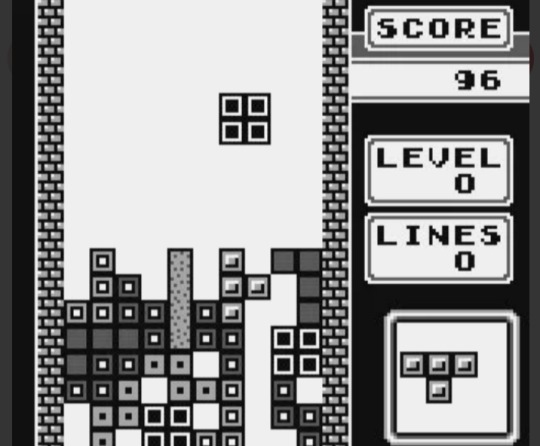
A ‘cognitive vaccine’
Her team began testing an array of visuospatial tasks that involve generating or manipulating images in the mind’s eye, such as imagining a constellation or tapping out a complex pattern.
One day, a student suggested they try a video game — and Tetris became the obvious answer.
“It involves colors, it involves space because you’re having to move blocks around to complete lines and, critically, it requires you to rotate the shapes in your mind’s eye,” Holmes says.
“You really have to use your mental imagery skills because you’re trying to fit the blocks into the right place.”
They started to experiment with Tetris — first, in the lab, by showing participants a traumatic film and, later, in the real world, by meeting with people in hospital emergency departments who’d just been in car accidents.
In both settings, people who played Tetris within hours of the trauma experienced significantly fewer flashbacks over the course of the next week compared to those who didn’t.
(58 percent fewer in the film study, and 62 percent fewer in the car accident study)
Based on the promising results of this proactive, preventative approach — which Holmes describes as being like a “cognitive vaccine” — they next turned their attention to established memories.
“The reality is, we’re not going to be able to get to most people within a few hours of a traumatic event occurring,” she says.
“People can have intrusive memories for years or decades, so clearly we need to do something for those older memories.”
In one study, Holmes’ team asked people receiving treatment for PTSD to focus on a specific flashback while playing Tetris for 25 minutes once a week for several weeks.
By the end of the experiment, participants saw a 64 percent reduction in the number of times that specific memory popped up, as well as an 11 percent reduction in memories they hadn’t targeted.

In another study, they worked with intensive care unit nurses who had established intrusive memories — including many that were more than three months old — of traumatic events from the COVID-19 pandemic.
After four weeks, nurses who played Tetris experienced one-tenth the number of intrusive memories compared to those who did not play.
They also reported improvements in other symptoms, such as insomnia, anxiety, and depression.
Overall, nurses who played Tetris saw a 73 to 78 percent reduction in flashbacks.
As Holmes points out, there’s probably nothing special about Tetris specifically.
She suspects any task with high visuospatial demands — like drawing, doing a jigsaw puzzle, or making mosaics — might achieve similar results.
However, tasks that are verbally distracting, like doing a crossword or reading, probably wouldn’t work as well.
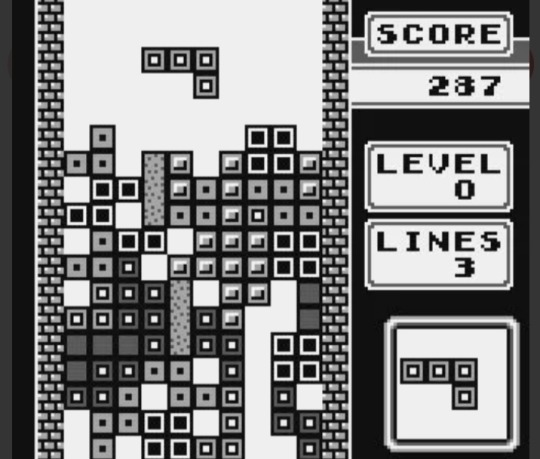
Tetris as a coping tool
Importantly, in their experiments, researchers aren’t just handing over a Game Boy and telling people to start playing Tetris.
Rather, they first ask participants to call to mind a particularly bad piece of a memory, called a hotspot.
Then, during gameplay, they instruct patients to mentally rotate the shapes, called tetrominoes, in their mind’s eye before they fall into the field of play.
They also ensure participants play Tetris for a sufficient length of time, usually between 10 and 20 minutes.
So far, all of their work has involved this procedure, which the researchers suspect is important to achieving results.
“Historically, intrusive memories of trauma are quite difficult to treat because they’re stuck in your mind for a reason — your brain’s gone into red alert and is trying to keep you safe,” says Holmes.
“They’re just really tricky things to alter. So if you’re just playing a game, it may help take your mind off things or reduce distress, but it might not help stop the flashbacks from intruding in the future.”
Still, playing Tetris on your own, without following the research procedure, likely won’t hurt you — and it may even help you feel better.
Canadian therapist Morgan Pomells recommends it to her clients as a coping tool for soothing feelings of anxiety or hyperarousal.
She doesn’t use Tetris during therapy sessions but, rather, suggests it as a potential option for moments when distressing memories or mental images arise during daily life.
“It’s one of the tools in the toolbox,” she says.
“A lot of people find it to be really helpful, especially people who have a really visual element to some of the symptoms they experience.
Turning to Tetris and being able to really sink into that game, even just for a couple minutes, allows them to feel a little safer and it really quiets their minds.
And when they resurface, they’re in a calmer state and actually able to take stock of their surroundings.”
However, Pomells cautions, Tetris or any other type of coping tool is not a substitute for seeing a therapist.
Holmes echoes that sentiment, adding that people who are suffering from flashbacks should first seek evidence-based treatment from a healthcare provider.
While Tetris may eventually become an evidence-based treatment itself, right now, researchers are still in the early stages of gathering clinical evidence.
“This is more of a journey of curiosity,” says Holmes.
Additional clinical studies are underway now. In the future, researchers also hope to test the long-term effects of Tetris on flashbacks, as well as understand what’s actually happening in the brain.
More broadly, they want to see if Tetris is effective at reducing intrusive memories related to other conditions beyond trauma, such as substance abuse disorders and depression.
“Mental images can haunt people in a variety of forms and I think it’s a real scientific challenge of the future,” says Holmes.
“It’s like being a physicist some centuries ago. We’ve just started to see the stars and planets, now we’ve got to go explore them.”
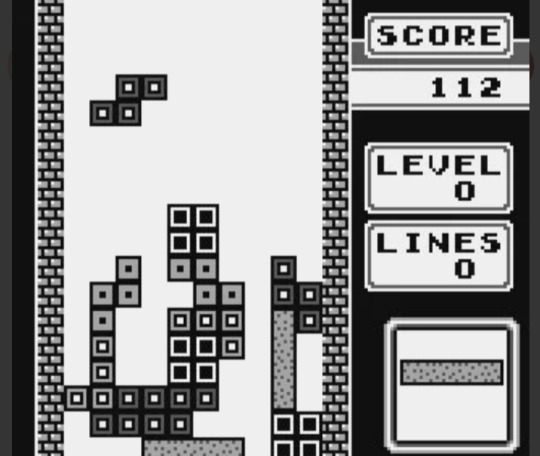
Tetris is a puzzle video game created in 1985 by Alexey Pajitnov, a Soviet software engineer.
It has been published by several companies for multiple platforms, most prominently during a dispute over the appropriation of the rights in the late 1980s.
After a significant period of publication by Nintendo, the rights reverted to Pajitnov in 1996, who co-founded the Tetris Company with Henk Rogers to manage licensing.
—
Alexey Leonidovich Pajitnov (born April 16, 1955) is a Russian computer engineer and video game designer who is best known for creating, designing, and developing Tetris in 1985 while working at the Dorodnitsyn Computing Centre under the Academy of Sciences of the Soviet Union (now the Russian Academy of Sciences).
#Tetris#video games#mental health#mental heath awareness#mental heath support#1980s#80s#20th century#digital puzzle#traumatic experience#trauma#post-traumatic stress disorder (PTSD)#PTSD#flashbacks#memories#psychology#cognitive vaccine#Game Boy#Alexey Pajitnov#puzzle video game#Nintendo#Tetris Company#Alexey Leonidovich Pajitnov
14 notes
·
View notes
Text
“If your daily life seems poor, do not blame it; blame yourself, tell yourself that you are not poet enough to call forth its riches; for to the creator there is no poverty and no poor indifferent place.”
—Rainer Marie Rilke (Austrian poet, 1875 - 1926)
#quote#quotes#poet#poets#austria#austrian#19th century#20th century#life#living#mindset#attitude#psychology#philosophy#imagination#motivation#motivational
8 notes
·
View notes
Text
I don't ask you to love me always like this, but I ask you to remember. Somewhere inside me there'll always be the person I am to-night.
– F. Scott Fitzgerald, Tender Is the Night
#book quote of the day#f scott fitzgerald#tender is the night#jazz age#French riviera#classics#20th century#psychological drama#American literature#book quotes
4 notes
·
View notes
Text
Review of Alien 3: It Could Have Been a Masterpiece But for Fox - Alien Retrospective Review Part 6
When David Fincher took the reins for Alien 3, it should have marked a bold new chapter in the franchise. Known for his exacting eye and willingness to explore dark psychological depths, Fincher had the vision to push Alien into uncharted territory, turning it into an exploration of isolation, despair, and survival in a brutally unforgiving universe. Yet, the film was haunted by constant studio…
#*Alien 3*#20th Century Fox#Alien franchise#Alien Queen#charles dance#Charles S. Dutton#David Fincher#existential horror#film review#filmmaking#iconic directors#isolation#missed masterpiece#movie analysis#movie production#psychological horror#Ripley#sci-fi horror#Sigourney Weaver#studio interference
1 note
·
View note
Text

Michel Foucault? You mean Michel Fucking -me-up dropping this knowledge in chapter 11 of "Madness and Civilization" (1968) holy shit. 🤯
#michel foucault#madness and civilization#history of psychology#history of psychiatry#20th century philosophy
0 notes
Text
This process of scrambling up the Great Chain of Energy is the foundation of what, following the tradition of evolutionary anthropologists since Naroll in the 1950s, I will call social development – basically, a group's ability to master its physical and intellectual environment to get things done.*
*Psychologists use the term "social development" very differently, to refer to children learning the norms of the societies they grow up in.
"Why the West Rules – For Now: The patterns of history and what they reveal about the future" - Ian Morris
#book quotes#why the west rules – for now#ian morris#nonfiction#energy chain#evolutionary anthropology#raoul naroll#50s#1950s#20th century#social development#physical environment#intellectual environment#psychology
1 note
·
View note